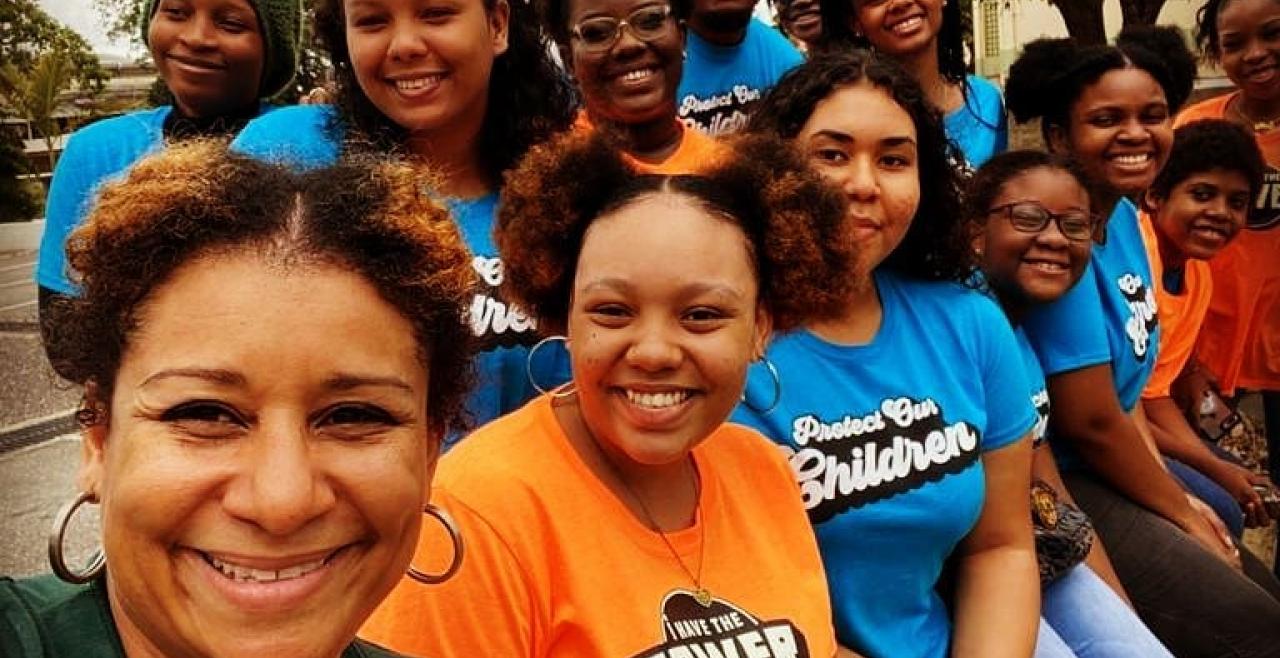In Trinidad and Tobago, helping children to understand and exercise their rights

Trinidad and Tobago - Nadella Oya is the founder of Createfuturegood, a Spotlight Initiative grantee that works with children from preschool to 18 years of age to help them better understand their rights. By engaging children and their families through workshops, creativity-based activities and digital media and campaigns, Createfuturegood aims to eliminate all forms of violence. They also work to help young people aged 18 to 29 as they navigate the transition into adulthood. Below, Ms. Oya shares more about her work.
It became overwhelming, hurtful, impossible to ignore. We kept asking the ubiquitous question, “What can we do?” - Nadella Oya, founder
How did Createfuturegood begin?
Over the years in my work, I had always unconsciously given a platform for children to tell their stories. There was a period in which the news was constantly flooded with stories of children being sexually assaulted and murdered. My friends and I would talk about it. It became overwhelming, hurtful, impossible to ignore. We kept asking the ubiquitous question, “What can we do?”
We engaged children to help figure out the best way to help other children, and to create ways to make their future lives and families better. That first group of friends had more friends who helped, guided and turned up. Now we have committed people all over the world who band together to help children enjoy their childhood and improve their wellbeing.
Nadella Oya explains how small grants will help Createfuturegood have an even bigger impact.
What are some of the strategies that you use to help children and families to understand their rights?
By equipping children with skills and giving them the opportunity to communicate positive (and often difficult) messages to their peers, we have built an organization that utilizes creativity-based interventions across traditional and online media to promote child rights for all children. Our messages are amplified through a range of activities including media-based campaigns, art-based workshops and murals. We also run child protection workshops with children, parents, teachers, and service providers working with children and adolescents.
"Seeing children and teens develop personally through the work they do with us is the best feeling ever." - Nadella Oya
What are some of the difficult issues that you talk about with children and parents?
Child sexual abuse, incest, countering violent extremism, violence against women and girls, mental health, xenophobia and bullying.
Why is this work so important?
As expressed by Nelson Mandela, “there can be no keener revelation of a society's soul than the way in which it treats its children.” All children deserve to grow up in safe, nurturing environments. We have a non-negotiable obligation to ensure that all children are aware of and enjoy all their rights. Without knowledge of their universal rights, there is an increased likelihood that such rights will be violated.
In Trinidad and Tobago and across the Caribbean, child rights violations such as child neglect, abandonment and sexual abuse represent a pervasive and systemic problem. The COVID-19 pandemic has further aggravated this situation.
"Children around the Caribbean have used the information they learned in our campaigns to protect themselves." - Nadella Oya
What is one of your proudest achievements?
Our biggest achievement is our Youth Team. Seeing children and teens develop personally through the work they do with us is the best feeling ever.
Our other major achievement is the impact of our work. Over the years, children around the Caribbean have used the information they learned in our campaigns to protect themselves and each other from hurt and abuse. That is our purpose. And we will continue doing this for as long as it takes to help children enjoy their rights.
Since 2006, our creative workshops have reached a combined total of 4,000 children and youth across the Caribbean. Additionally, our digital videos have received over 500,000 views on social media.
What kind of change do you see in the children and families that you engage?
Many children – and even adults – experience changes in basic assumptions about their rights and responsibilities. It is quite common to see expressions of joy as participants embrace new knowledge and skills. Some participants have shared that these sessions were the first time they had the opportunity to share their experiences, and for children these moments represent the first time they could honestly and openly share with adults.
We sometimes see intergenerational changes as children, parents and other members of the family commit to living the values which our messages promote. Some of the children we worked with grow up to stand for child rights and take action, either as a member of Create Future Good or within other spaces.
Interview has been edited for clarity and length.
